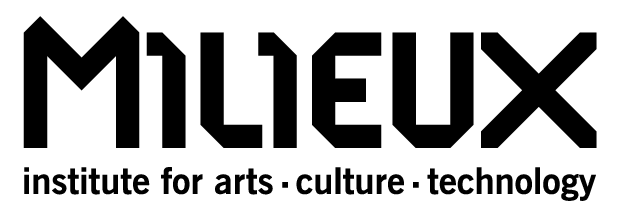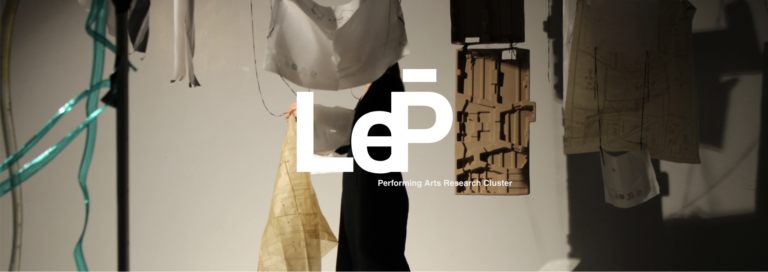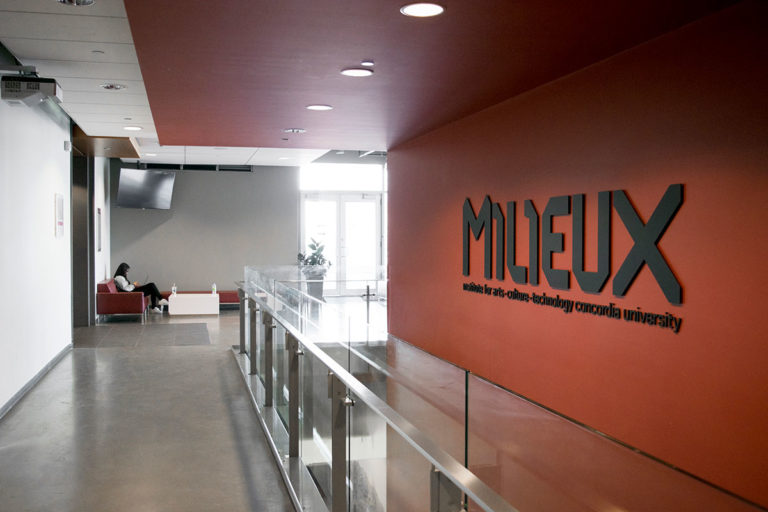It’s clear the moment you cross the threshold into SenseLab’s light-filled work space on the EV Building’s 10th floor that you’re entering an atypical academic environment. As a newly formalized part of Milieux’s LePARC performing arts research cluster, SenseLab subverts institutional structures and invites new forms of interaction and meaning-making into and alongside the university setting. The Lab’s members are constantly generating novel learning environments and inviting new possibilities, like research into cryptocurrencies as a source of income for the group’s projects.
At SenseLab, it all starts with being open: to questions, to new members and to transformation.
The questions SenseLabbers, as they call themselves, address depends on what they encounter, but tend to concern pedagogy and research-creation.
A pressing contemporary concern for many universities is the breaking down of detrimental divisions, whether between disciplines, researchers or with the outside world. But those kind of silos aren’t really a concern at SenseLab. About half of global members are university affiliated, while the other half are independent artists and activists. All work at the intersection of politics, art and philosophy.
Although the original Montreal hub at Concordia is the largest, a 2012 Partnership grant from the Social Science and Humanities Research Council of Canada made it possible to launch hubs in Australia, Brazil and Europe.
“We wanted people to be able to intervene in their local environments as much as possible,” says Erin Manning, Senselab’s founder and director, and associate professor in Studio Arts and Film Studies and Concordia Research Chair of Relational Art and Philosophy.
In the SenseLab space at Concordia
It’s in that 10th-floor plant-filled room with writing on the windows that SenseLab holds reading groups, workshops, speaker series and more.
Anyone can propose these practises, as Manning calls them, and everyone is welcome to attend. You need a key to get into the SenseLab space, but anyone who asks gets one.
The Lab’s main reading group has been going since 2003. Last term a group of undergraduate students from Manning’s collective independent study on blackness, race and neuro-diversity decided to meet in the SenseLab space.
Manning says readings can be instructive for anyone – undergrads, researchers and others. In January, a homeless person joined the group. This year, they’re reading the philosopher Spinoza, and they primarily study process philosophy.
“Process philosophy becomes really important for thinking about modes of encounter, which facilitate other modes of living,” says Manning.
Manning usually adds new SenseLab members to the group’s online platforms, Basecamp and Slack. That’s where they’ll find information about practises. The SenseLab Basecamp group has almost 700 members globally. While these kind of online platforms are often used by corporations and organizations as a conventional scheduling and communications tool, at SenseLab they are where anyone can make a suggestion for a practice (schizo-somatic workshop on voice, anyone?) and the place where SenseLabbers from around the world unite.
There’s no pressure to participate. “We honour lurking. Lurking is also a practise,” says Manning. “Your commitment is your own. You come once, that’s great. You come 50 times, that’s super, your presence will alter things. If we meet someone who needs childcare to participate, we’ll try to organize child care. We really work to facilitate entry.”
While the goal is to foster a radically inclusive environment, there are members who’ve been with the group for 15 years who provide a certain structure.
This openness applies to all SenseLab activities. There’s no call for proposals for SenseLab’s two book series or for papers for their journal, Inflexions. This deadline-free way of operating means works are collected for publication in an open-schedule way based on “appetite and necessity,” explains Manning. SenseLabbers curate the issues of the journal, and for the book series they read proposals as they receive them.
While the line-up of future practises is still open, Manning does describe an emerging focus. “We feel a strong sense of wanting to learn from indigenous and non-white practises,” she says.
“Of course we have collaborators who are people of colour, but they’re not a majority, so how do we think that through so we can make sure we’re also responding to interests that might attract those communities as well?” she asks.
The SenseLab ‘event’
The practises and philosophy work lead up to what’s called an “event,” a large, unstructured collective research-creation project where something is transformed. Members from around the globe come together for multiple days, without a schedule.
The last event was in Brazil in December 2017, and the next one is in Naples in May 2018. Both concern research-creation into alternative and cryptoeconomies, and collective action.
The research at these events concerns process and includes SenseLab’s work on the anarchive, an expanded book form that explores the inability to truly archive an event.
Neuro-diversity and learning
For a decade SenseLab has also been involved in neuro-diversity and the question of inclusive education.
“How can we create opportunities for more complex ways of learning that include those modes that don’t look like neuro-typical forms of learning?” asks Manning, who welcomes autistic students into her classroom.
The SenseLab commitment to alternative methodologies extends beyond pedagogy to the very viability of their work. Another question that’s come up is whether there will be a physical space for this kind of inclusive learning. Manning and SenseLab don’t necessarily want compete with other artist-run centres for grants to build and run an institute so they’re looking at other ways of making money, hence their research into alternative economies and crypto-currencies.
“We try for a radical openness, but it’s hard because there are no rules to go by. You build an ethics. That’s what it’s about. Philosophy can be a living practice.”



